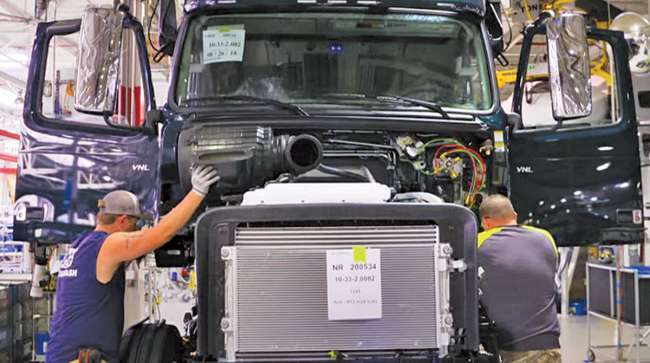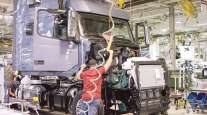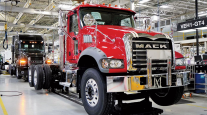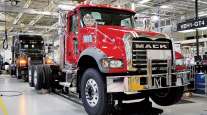Senior Reporter
October Class 8 Orders Near 22,000

[Stay on top of transportation news: Get TTNews in your inbox.]
North American Class 8 orders in October nearly hit 22,000, according to ACT Research.
The monthly number arrives as a marker of the frustration gripping trucking when it comes to equipment.
Orders could be much higher given fleet demand, but the troubled supply chain won’t let truck makers raise production to meet that. There is scant inventory. Costly materials are rising again — already ordered trucks are hit with repeated surcharges. Fleets are sharing that unexpected cancellations are occurring.

Mihelic
“The breadth of the challenge is so broad,” said ACT Vice President Steve Tam. “It looks like it will stretch well into next year, if not all the way through next year, before we kind of put these bad memories behind us.”
Class 8 orders were 21,900, according to ACT, which cited preliminary numbers the truck makers will adjust shortly. A year earlier, orders were 39,089.
Meanwhile, feedback from some fleets is that truck makers are canceling some orders, Rick Mihelic, president of Mihelic Vehicle Consulting in Lewisville, Texas, told Transport Topics.
“If you ordered a truck six months ago, a lot of related prices have gone up; and somebody has to compensate for that somewhere in the process. Somebody [at a truck maker] could make a lot of cost adjustments to the order. Or you can just cancel the order and have [customers] resubmit it,” he said.
Mihelic said he was told by “major fleet buyers” at recent industry events that had happened to them.
“When you start collecting orders for trucks in the backlog, at some point they don’t mean anything if you haven’t the ability to actually build them to a schedule,” he said. “We used to call it ‘water in the backlog,’ ” he said, referring to his time at Paccar Inc.
As for when limitations clear up and production moves steadily forward, he said, “It’s challenging to think of all of the production issues in all of these factories being fixed all at the same time. A lot of things have to be worked out for the supply chain to get back to being healthy.”

Stuart
"It is a new time,” said Darry Stuart, principal at DWS Fleet Management, a limited-time-executive transportation and fleet management business based in Wrentham, Mass.
Asked what the fleets he works with are seeing, he responded with what sounded like a lament.
“Orders canceled, reorder and a new price. No real delivery date, and in some cases questionable pricing,” he said. “Also as we move forward, higher deposits for orders. And for the small guy, no negotiations on prices.”
The conditions are bad for the entire industry, said Don Ake, vice president of commercial vehicles at FTR. “The industry, as far as equipment goes, is stuck and it’s difficult to get unstuck.”
FTR pegged preliminary orders at 24,500.
“There are no winners and losers. There’s just losers. There’s no way to get around this,” Ake said. “There’s no way to make things fair, or make things good.”
Amid what he called unprecedented conditions, he pointed out everybody is trying to do the best they can.
“The truck makers wish they could sell more, fleets wish they could buy more, the suppliers wish they could supply more.
“Everybody has had their stress level raised,” Ake said. “The amount of stress, personal and functional, is just much, much higher than normal.”
Truck makers described the situation in various ways.
Daimler Trucks has opened its 2022 order book in North America with “record incoming orders for the first days,” Jochen Goetz, chief financial officer at Daimler Trucks & Buses, said during an earnings call in late October. “September was the second-highest order intake month in the history of Daimler Truck Group and our order book is at a level we haven’t seen ever before.”
At Volvo Trucks, in the third quarter its North American Class 8 orders climbed 75% to 21,750. Truck deliveries were up 67% to 10,222, compared with a year earlier, Volvo Group CEO Martin Lundstedt said with the release of its latest earnings.
“It’s a question of fleets needing to both renew and expand their fleets,” said Lundstedt. “But the persistent problems in the supply chain have meant that we from time to time have been forced to stop or slow down production.”
ACT Research: Preliminary NA Class 8 and MD Orders Pull Back in Octoberhttps://t.co/DHS5QAcyTo — ACT Research (@actresearch) November 3, 2021
At Navistar, a unit of Traton Group, one executive expected pent-up demand will continue to spill over.
“The disconnect between customer demand and truck maker delivery capability due to component delays will likely continue in 2022,” said Steve Gilligan, vice president of pricing at Navistar.
“The general 2022 outlook is positive with solid underlying economic growth,” he said, “and the increasing carrier profitability is benefiting on-highway product demand.”
At the same time, Paccar Inc., in its latest earnings call, reported it recently had 10,000 trucks “offline” that were largely but not completely finished due to supply chain shortages.
Tam said ACT has heard estimates as high as 35,000 for red-tag trucks. “We think that number has come down, but it is still way more than it should be.”
Want more news? Listen to today's daily briefing below or go here for more info:




